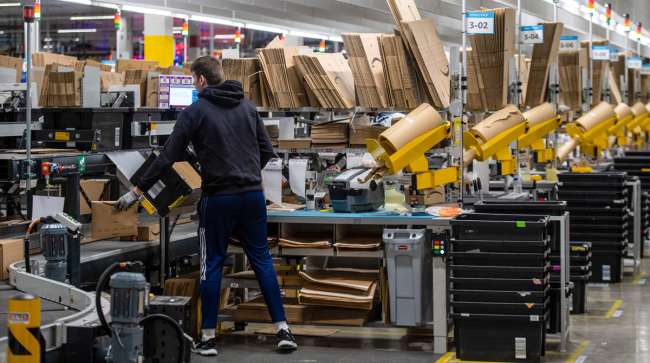Amazon Rejects Senate Report on Workplace Safety Standards

[Stay on top of transportation news: Get TTNews in your inbox.]
Amazon.com Inc. leaders ignored internal recommendations that the company relax warehouse worker productivity rates to curb injuries, according to a report from a congressional committee.
Released Dec. 16 by the majority staff for the Senate Committee on Health, Education, Labor and Pensions, the report makes the case that the e-commerce giant instead accepted “injuries to its workers as the cost of doing business.”
Amazon has long been a target of worker’s rights advocates and labor unions, who say the company pushes its employees too hard in the name of getting packages to customers quickly. The company, the second-largest private U.S. employer behind Walmart Inc., contends that it has made worker safety a priority. A company blog post published early Dec. 16 rejects the report’s contentions and accuses the committee’s chair, Vermont Senator Bernie Sanders, of misleading the American public.
Amazon ranks No. 1 on the Transport Topics Top 100 list of the largest logistics companies in North America and No. 1 on the global freight TT50. Walmart ranks No. 1 on the TT100 list of the largest private carriers in North America.
The 159-page Senate report says Amazon’s policies, including productivity targets, risk worker injury owing to exhaustion and repetitive stress. It highlights a pair of internal studies Amazon undertook to examine the causes of warehouse injuries after they surged in 2019.
Lori Heino-Royer of Waabi discusses the latest developments, breakthroughs and key industry partnerships in autonomous trucking. Tune in above or by going to RoadSigns.ttnews.com.
The first, Project Soteria, began in 2020 and was described by its facilitators as the first time Amazon had conducted a comprehensive analysis of the causes of injuries in its warehouses. The study found a connection between worker speed and injuries, echoing a similar finding made by Washington state workplace regulators, and recommended pausing speed-related discipline and adding more downtime to workers’ schedules.
Two years into the company’s investigation, Amazon’s senior safety executive asked another team to review the Soteria team’s work. The probe took issue with Soteria’s methodology and recommended increasing the frequency of safety meetings.
“There is a clear through line in the evidence: Even when Amazon was presented with an analysis generated by its own internal teams concluding that higher speed can increase the risk of injuries, it chose to ignore that analysis and instead to search for alternative explanations that were more convenient and that favored the company’s bottom line,” the report said.
Amazon says Soteria’s analysis was preliminary, outdated and inaccurate. Spokesperson Kelly Nantel said the company’s expectations for staff are safe and reasonable and pointed to recent declines in the company’s injury rates.
“Sen. Sanders’ report is wrong on the facts and weaves together out-of-date documents and unverifiable anecdotes to create a pre-conceived narrative that he and his allies have been pushing for the past 18 months,” she said in an emailed statement.
Want more news? Listen to today's daily briefing above or go here for more info
Nantel also highlighted a Washington state Bureau of Industrial Appeals judge’s dismissal earlier this year of high-profile workplace safety citations against the company. The state labor regulator is appealing that decision.
During the Senate committee investigation, staffers interviewed 135 workers and reviewed 1,400 documents provided by workers. The company contributed 285 documents, according to the report, which accuses Amazon of only limited cooperation. (Amazon’s Nantel said the company voluntarily cooperated in good faith.)
The report arrives about a month before Sanders will cede his committee chair as Republicans take control of the chamber. Sanders has long been a critic of working conditions at Amazon’s facilities and has occasionally sparred with company executives.
The report describes a second initiative, called Project Elderwand, which began around 2021 and sought to understand how workers’ repeated movements over 10- or 12-hour shifts might effect their risk of developing soft-tissue musculoskeletal disorders. It found that for the workers who grab items from Amazon’s robotic storage units, the likelihood of back injuries increased alongside the number of items picked during a shift.
The Elderwand team proposed enforcing more work breaks, an initiative that was tested in a small pilot program to avoid disruptions to Amazon’s productivity, the report said. The company also rejected the findings, the report said. Amazon’s Nantel called the program’s proposed solutions ineffective and said the company had pursued other ergonomic improvements.
Committee staff recommended passing a slate of bills that would compel Amazon to disclose workplace productivity quotas and beef up Occupational Safety and Health Administration penalties and enforcement powers, among other measures.





